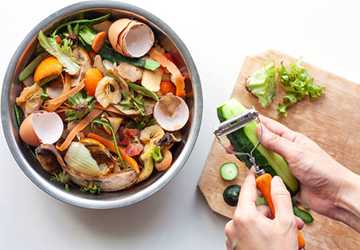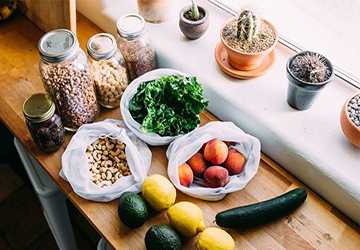10 Easy Ways to Practice Sustainability in Your Everyday Life
Ever find yourself pondering on how to make a difference in this world? Have you watched a documentary on climate change or read a report on deforestation and felt a pang of helplessness?
Well, if you want to play your role, there are simple, daily actions that could positively impact our planet!
Sustainability is a crucial pathway to the future, fostering economic growth, social justice, environmental stewardship, and strengthening governance.
There are easy ways to start practicing sustainability that doesn't require an entire lifestyle overhaul. This blog post will unfold ten accessible, everyday practices that can help guide you toward a more sustainable lifestyle.
So, are you ready to make a difference?

The Importance of Incorporating Sustainability into Your Daily Routine
Why should you consider sustainability as a part of your day-to-day activities? The reasons are numerous and compelling, with direct ties to the health of our planet and, ultimately, the survival and prosperity of humankind.
● Environmental Impact: Every action we take has a footprint. The food we eat, the energy we use, and the products we consume all come from the Earth and go back into it in one form or another. Unsustainable practices are depleting our resources and polluting our environment at an alarming rate.
● Rate of Consumption: We are currently using resources faster than they can naturally replenish. This overconsumption strains our natural resources and disrupts ecosystems and biodiversity.
● Waste and Emissions: Our waste and emissions, if not correctly managed, contribute to environmental issues like climate change, air and water pollution, and soil degradation. These problems affect not just wildlife but also human health and living conditions.
● Unsustainable Lifestyle: In plain terms, the way we live now - consuming more than we need, producing excessive waste, and heavily relying on fossil fuels - is not sustainable in the long run. Our actions today can jeopardize the quality of life for future generations.
● Positive Change: The excellent news is by choosing to live more sustainably, we can reduce our environmental impact and help to restore balance. This means consuming less, recycling more, choosing renewable energy sources, and making more informed, eco-friendly choices.
10 Super Simple Swaps for a More Sustainable Lifestyle
The sustainability journey may seem daunting, but it doesn't have to be! Here are ten easy, practical ways to make a difference in your everyday life.
1.Ditch Single-Use Items
● Introduction: Single-use items like plastic bags, water bottles, straws, and cutlery contribute to waste and pollution.
● Sustainability Journey: You can significantly reduce your environmental impact by eliminating these items from your routine.
● Application: Start by investing in reusable alternatives like cloth shopping bags, metal straws, and water bottles. Remember, it's not just about buying new things - try to use what you already have as much as possible.
● Considerations: When shopping for reusable items, look for durable ones made from sustainable materials.
2.Eat Less Meat
● Introduction: The meat industry significantly contributes to greenhouse gas emissions, deforestation, and water pollution.
● Sustainability Journey: Reducing meat consumption can help combat these environmental issues.
● Application: Start with small steps like having one meat-free meal weekly. Explore vegetarian and vegan recipes; they can be surprisingly delicious and filling!
● Considerations: Always aim for a balanced diet. Consider consulting a dietitian or nutritionist if you want to make significant changes.
3.Compost Your Kitchen Scraps
● Introduction: Composting organic waste like fruit peels and vegetable scraps helps reduce landfill waste.
● Sustainability Journey: It's an easy way to give back to the Earth by enriching the soil in your backyard.
● Application: Begin by collecting kitchen scraps in a compost bin. After a few weeks, you'll have nutrient-rich compost for your garden!
● Considerations: Make sure you're only composting appropriate materials. Meat, dairy, and processed foods usually aren't suitable for home composting.

4.Switch to Energy-Efficient Appliances
● Introduction: Traditional appliances can use much energy, contributing to greenhouse gas emissions.
● Sustainability Journey: Energy-efficient appliances can reduce energy use, saving you money and reducing your carbon footprint.
● Application: Choose a high energy efficiency rating when replacing an appliance.
● Considerations: Energy-efficient appliances can be more expensive upfront, but they often save money in the long run.
5.Reduce, Reuse, Recycle
● Introduction: The three R's of sustainability can significantly decrease the waste we generate.
● Sustainability Journey: We can minimize our environmental impact by following this principle.
● Application: Start by reducing what you consume, reusing what you can, and recycling what you can't reuse.
● Considerations: Always check local recycling guidelines, as they vary by location.
6.Choose Local and Seasonal Foods
● Introduction: Transporting food long distances contributes to greenhouse gas emissions.
● Sustainability Journey: You can reduce your carbon footprint by choosing local and seasonal foods.
● Application: Try to shop at local farmers' markets and choose foods that are in season in your area.
● Considerations: Remember, buying local isn't just about reducing emissions - it's also a great way to support local farmers and economies.
7.Use Public Transportation or Carpool
● Introduction: Cars are a significant source of air pollution and greenhouse gas emissions.
● Sustainability Journey: By using public transportation or carpooling, you can help reduce these emissions.
● Application: If possible, opt for public transit, biking, or walking for your daily commute. If you need to use a car, try to arrange a carpool.
● Considerations: Consider safety, convenience, and time when planning your commute. Sometimes, combining different modes of transportation can be the best solution.
8.Save Water
● Introduction: Freshwater is a precious resource, and it's essential to use it wisely.
● Sustainability Journey: Conserving water helps protect this vital resource for future generations.
● Application: Small changes like turning off the faucet while brushing your teeth, taking shorter showers, and using a rain barrel to collect water for your garden can make a big difference.
● Considerations: Every bit counts! Find ways that work best with your lifestyle to conserve water.
9.Plant a Tree or Create a Garden
● Introduction: Trees and plants absorb carbon dioxide, helping to combat climate change.
● Sustainability Journey: By adding more greenery to our world, you can contribute to a healthier planet.
● Application: If you have space, plant a tree in your yard. Alternatively, create a small garden or even just a windowsill herb garden. Every bit of green helps!
● Considerations: Choose plants that are native to your area - they'll likely thrive with less work and be beneficial to local wildlife.
10.Educate Yourself and Others
● Introduction: Knowledge is power when it comes to sustainability.
● Sustainability Journey: The more you understand the environmental impact of your choices, the more you can make sustainable decisions.
● Application: Stay informed about environmental issues and sustainability practices. Share your knowledge with friends and family to spread awareness.
● Considerations: Remember, the goal is not to be perfect but to make better choices where you can. We're all learning and growing together!
Conclusion
Incorporating sustainability into your everyday life is essential not only for the health of our planet but also for the well-being of future generations.
You can make a significant impact by following these ten easy ways to practice sustainability.
Remember, even the most minor changes in our daily habits can contribute to a more sustainable future.
So, let's take action, inspire others, and create a world where sustainability is the norm. Start today, and be a part of the solution for a better tomorrow.





